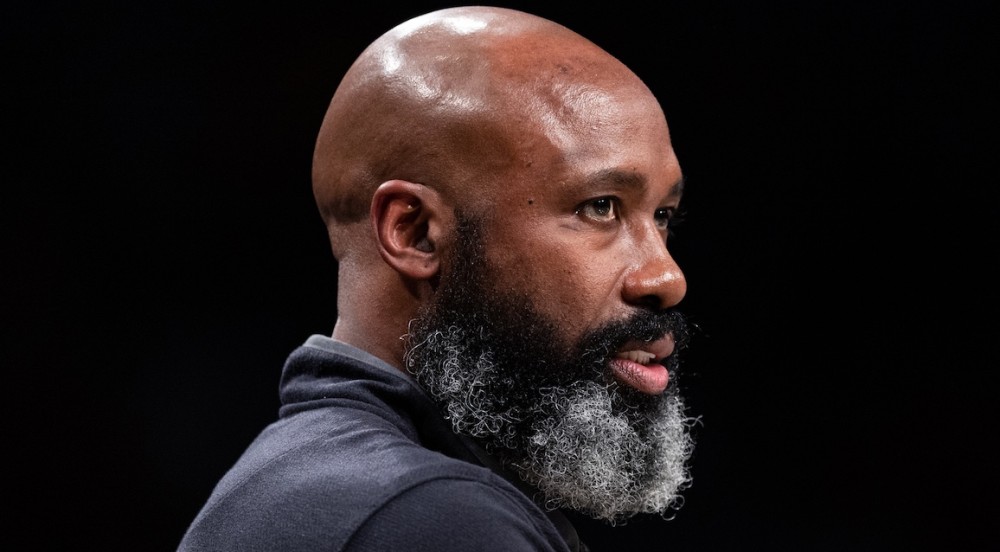With the Brooklyn Nets recently hiring Jacques Vaughn as their new head coach, that brings the total number of Black NBA head coaches to 16—the first time ever the league had a majority of Black head coaches.
The Brooklyn Nets have been the talk of the NBA this season, for all the wrong reasons.
Player Discontent. Firings. Suspensions. Poor play.
This franchise of late has been filled with a series of bad optics, left and right. But their most recent move has a “they finally got something right!” vibe to it.
Not only did the hiring of Jacques Vaughn as their head coach provide some much-needed stability and good press for the organization, but it brought about something even more significant—the first-ever majority of NBA head coaches being Black.
In a league that has been dominated for decades by difference-making, culture-changing Blacks on the court, never have the majority of the league’s head coaches mirrored the product on the court like it does now.
Vaughn became the 16th Black NBA head coach this season after the Nets parted ways with Steve Nash and decided to focus on hiring Vaughn after flirting heavily with the idea of bringing in Boston Celtics head coach Ime Udoka who is serving a one-year suspension for violating team policies when he had an improper but consensual relationship with a Celtics employee.
The lack of Black head coaches has been a topic of discussion for years, often resulting in a year or so when the numbers spike only to be followed by a precipitous dip.
But this feels and looks different. Why?
Because what we’re seeing now more than ever, is what Black on-the-rise coaches have been angling for, for years.
And that is to be given an opportunity for their record of achievement and not just their race, to factor into opportunities to lead teams.
When you start to look closely at the most recent Black head coaches hired, you start to see a pattern that involves them patiently waiting for their turn to lead instead of skipping to the front of the line.
The Nets will never admit it, but they should have never hired Steve Nash which looks even worse when you consider the two men they seriously considered for Nash’s replacement, Udoka and Vaughn, who were on their staff and available.
Nash was a great player and should be a first-time ballot Hall of Famer. But having never coached a team at any level, to be given the keys to lead one of only 30 jobs that exist in the world?
That would be like Twitter hiring someone to lead them because that person has a lot of followers.
Social justice has become more than just a talking point the last couple of years. There is a sincere effort on the part of many to bring this about, in various ways.
But when it comes to the NBA, as much as owners have put their financial resources behind this movement, they still want to win.
And what we’ve seen of late, is many of the best coaching jobs are being done by Black head coaches.
Go back to the playoffs last season.
Of the final four coaches in the playoffs, three of them (Dallas’ Jason Kidd; Miami’s Erick Spoelstra and Boston’s Ime Udoka) were men of color. The teams with the top overall records in the Eastern (Spoelstra) and Western Conference (Phoenix Suns’ Monty Williams), were led by men of color as well.
Fast forward to this season and once again, diversity reigns near the top of the standings.
Including games played up to November 10, four of the top six overall records by teams in the Eastern Conference have Black head coaches. In the West, two of the top three records are teams with a Black head coach.
A big part in the increased numbers is the increased opportunities to not just coach an NBA team, but actually, coach a team that has a chance to succeed sooner rather than later.
Far too often, Black coaches were brought in to rebuild a team and once they reached a certain level of success, the expectations changed and so did their employment status.
While Steve Kerr has done a great job in helping build the Golden State dynasty which includes four NBA titles in the last eight seasons, it’s hard to look at their success and ignore the role that ex-Warriors coach Mark Jackson, who is Black, played in setting the foundation for that success.
Whatever the reasoning may be, Black NBA head coaches are being given comparable treatment to their white counterparts when it comes to opportunities to succeed.
And that has created a new sound for the league. That sound?
It’s called progress, a sound that has been a long time coming for the NBA when it comes to Black head coaches.













